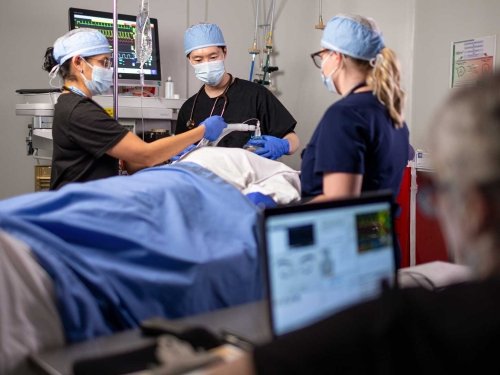Nurse Anesthesia Entry into Practice
Our program helps you create a solid foundation in the basic sciences and in all aspects of anesthesia practice. Your skills will be built over a 36-month program that emphasizes building an advanced knowledge base with hands-on clinical experience.


AZ - Glendale
- Hybrid
College Doctor, Nurse Anesthesia Entry into Practice (AZ)
Duration36 months
Class Size Approximation36
The Midwestern Advantage
Midwestern University's investment in education, faculty, research, facilities, and clinical training translates into our students being "Day One Ready.”
The College of Health Sciences' Nurse Anesthesia Program helps you create a solid foundation in the basic sciences and in all aspects of anesthesia practice. Your skills will be built over a 36-month program that emphasizes building an advanced knowledge base coupled with outstanding hands-on clinical experiences.
All advanced practice nursing specialties, including nurse anesthetists, require advanced education that incorporates classroom instruction and supervised clinical experience in hospitals and other health care facilities.
- You will take courses in principles of anesthesia, anatomy, physiology, pathophysiology, biochemistry, and pharmacology.
- Topics such as principles of anesthesia practice, including physics, equipment, technology, and pain management are also covered.
- You will take courses in study methods of scientific inquiry and statistics and participate in student and/or faculty research.
- Supervised clinical experience takes you into hospital departments such as pediatrics, maternity, and surgery, where you learn anesthesia techniques, test theories, and apply your knowledge to clinical problems.
Upon completion of your graduate-level education, you are prepared to sit for the certification examination, which results, when successful, in the Certified Registered Nurse Anesthetist (CRNA) designation.
As a nurse anesthetist, you will be part of tomorrow's healthcare team in rural and urban hospitals, same-day surgery centers, doctors' offices, and pain clinics. We will provide you with the knowledge and skills that will be the foundation of a patient-centered career.
View program details in our Academic Catalog*
*Subject to change
As a Certified Registered Nurse Anesthetist (CRNA), you are an advanced practice nurse who is trained to safely provide anesthesia services to surgical, obstetrical, and trauma patients.
- You collaborate with surgeons, anesthesiologists, dentists, podiatrists, and other qualified health care professionals to provide anesthesia and related care before and after medical procedures.
- You will provide pain management and emergency services, such as airway management.
According to the American Association of Nurse Anesthetists (AANA):
- CRNAs practice in every setting where anesthesia is delivered: traditional hospital surgical suites and obstetrical delivery rooms; critical access hospitals; ambulatory surgical centers; offices of dentists, podiatrists, ophthalmologists, plastic surgeons, and pain management specialists; the U.S. military, public health services, and Department of Veterans Affairs healthcare facilities.
- Nurse anesthetists first provided anesthesia on the battlefields of the American Civil War and have been the main providers of anesthesia care to U.S. military men and women on the front lines since WWI; today, CRNAs continue to be the primary providers of anesthesia care to U.S. military personnel on front lines, navy ships, and aircraft evacuation teams around the globe.
- CRNAs are the primary anesthesia providers in rural America, inner cities, and other underserved areas, allowing obstetrical, surgical, and trauma stabilization services to be offered to patients in these locations.
- Each year, CRNAs administer approximately 50 million anesthetics to patients in the United States.
- As with the overall need for nurses to provide care for an expanding and aging population, the demand for nurse anesthetists is expected to remain strong.
While you are trained to deliver anesthesia and related care in a variety of general clinical settings where you function with a high degree of autonomy and professional respect, you may also choose to specialize in pediatric, obstetric, cardiovascular, plastic, dental, or neurosurgical anesthesia. Or you may provide clinical support services outside of the operating room, in areas such as MRI units, cardiac catheterization labs, and lithotripsy units.
If you are interested in pursuing advanced nursing knowledge or specialization; are caring, sympathetic, responsible, and detail oriented; able to direct or supervise others; can correctly assess patients' conditions and determine when consultation is required; able to work as a member of the healthcare team; possess the emotional stability to cope with human suffering, emergencies, and other stresses, a career as a nurse anesthetist may be just right for you.
At Midwestern University, we prioritize research to advance knowledge and offer students enhanced learning opportunities, fostering close collaboration with faculty researchers and peers on innovative projects.
Academic Course Catalog
Explore comprehensive details about our academic programs (subject to change).
Career Placement & Salaries
*Median Salary (2024) U.S. Bureau of Labor Statistics
**American Association of Nurse Anesthesiology, 2025 CRNA Compensation & Benefits Study
Campus Options


Glendale
Located just 15 minutes from downtown Phoenix. Students can study and live on our sprawling 143-acre campus and practice at our University-owned clinics located just across the street.
